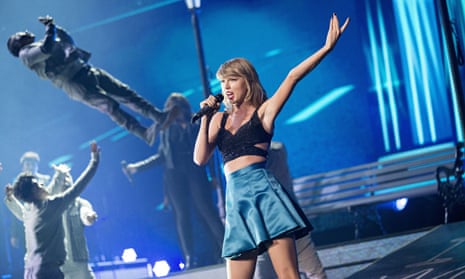Where is the Taylor Swift of news? Not for glamour or youth, though lord knows the business could do with both, but someone with the singer’s ability to convince technology companies to pay for their work.
Within days of Swift asking Apple to pay musicians royalties during a trial of its streaming service, one of the world’s largest technology companies had succumbed to the youngest person to be included on Forbes’ most powerful women list.
There are so many reasons a letter starting “Dear Apple” and ending “love Rupert” would not have the same impact. Yet the entire news industry, and not just Rupert Murdoch, has allowed the idea of news as a no-value commodity to take hold – with a report from Syria or the Federal Reserve as interesting to advertisers as one of the 4m mentions of laundry posted on Facebook each day, or possibly less so.
This is not a debate about paywall versus free but one about the value of news itself. Last week, at the Cannes Lions advertising festival, news and its value was everywhere, most noticeably in the behaviour of this year’s festival darling, Snapchat. As will.i.am said at one yacht-based event: “The real rock star is Snapchat, isn’t it?”
The video and picture messaging app founded by Evan Spiegel in 2011 now boasts nearly 100 million daily active users and more than 2bn video views a day. Although its marketing campaign launched in time for Cannes was disappointingly soulless (Spiegel’s promo definitely doesn’t exemplify the sort of messages that have made him a billionaire), Snapchat excites ad types largely because of its popularity among “centennials”, a term for under-18s just as hideous as “millennial”. (Indeed, if the search for the youth market ever makes “foetals” the talk of Cannes we will have truly entered the Nathan Barley seventh circle of hell).
Yet among the first things Snapchat announced last week was a tie-up with the Daily Mail and ad giant WPP. Although the venture may or may not produce more than a few video advertorials, it underlines the fact that Snapchat wants content, and not just empty content but actual stories.
Mail Online’s Martin Clarke stressed that the most popular thing published on the world’s most visited English language website was news, not “showbusiness”. “They came to us,” he said of the Snapchat deal which was widely criticised as an empty press release. Now, admittedly the line between news and celebrity is more blurred on the Mail site than on some outlets, but Clarke’s distinction was important and echoed by other executives from Google, Gawker and Dow Jones last week.
Even Martin Sorrell, that great proselytiser for the media companies such as Vice which he owns a stake in, suggested that the desire to read all about it could help “traditional media companies”. “The pendulum has swung back a bit towards traditional newspapers,” he said. “People realise that they have more power than they’ve been given credit for.”
Which all might help to explain why so many technology companies which have long denied any interest in becoming “media” companies are now busily appointing their own editors. Apple has started recruiting journalists, while Snapchat is hiring a “content analyst – politics and news” to curate messages ahead of the 2016 presidential race.
Spiegel, younger at 25 than the first wave of tech billionaires, seems to understand better than they do that the dichotomy between media and technology is false. Asked if Snapchat was a technology or media company, he replied: “We are a technology company with a media business”. His rivals have typically run a mile from the idea that they might be publishers and therefore in any way responsible for their content.
But how far can it go? The answer has less to do with the right business model and much more to do with the issue of trust. You can’t sell things to people who feel you can’t be trusted not to sell them a pup.
Celebrities seem to get this more than most people in the news business. Kim Kardashian West, a woman who has made a commodity out of her own life, said last week that she had had to learn not to “over-promote” - so she keeps her Instagram account separate from any promotional deals, for example, so that her fans continue to believe her endorsements. (She still demands an estimated $400,000 appearance fee for the things she really likes but that’s another story).
The issue of trust in the media is a vexed one. When people are asked who they trust to tell the truth, most British polls put “journalists” near the bottom. Yet one US study this month from the Pew research unit found that across all ages – from millennial to boomer in the jargon – about 40% of readers trusted the news organisations they had heard of.
Which is one reason why newspapers like celebrities endorsing their brand. In Cannes, that sunny shrine to stardom, Sorrell put it like the money man he is: “One of the biggest avenues of growth … is the use of celebrity … [they can] influence young people.” Only if the endorsement and work is genuine surely, as otherwise we just know they’ll be trouble.

